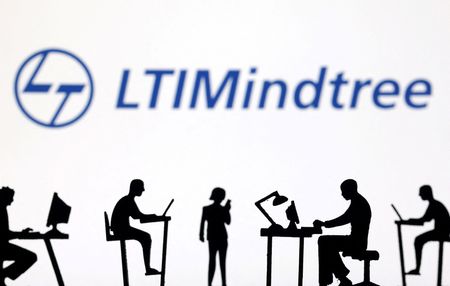By Bharath Rajeswaran and Shubham Batra
(Reuters) -India’s top investment funds are pivoting inward, betting on the resilience of the domestic economy and a rebound in corporate earnings, while retreating from export-driven bets amid escalating global trade tensions.
The NSE Nifty 50 index recovered from a tariff-driven slump earlier this month, turning positive for 2025 with a nearly 8% jump in just two weeks.
However, it remains 8% below the record highs of September 27, weighed by muted earnings, record foreign outflows, and ongoing trade tensions.
As global uncertainty persists, multiple fund managers said they remain cautious on sectors such as information technology, energy and commodities due to their exposure to global economic growth.
Instead, fund houses are focusing capital on sectors seen as safer plays offering growth with less volatility.
“We are focusing on companies with lower exposure to global trade risks, which are available in financials, consumer staples, consumer discretionary, defence and healthcare sectors,” said Sanjay Bembalkar, head of equity at Union Asset Management Company, which manages $3.5 billion in assets.
Financials have led the Nifty rally in 2025, rising more than 12% on expectations of further monetary easing and liquidity injections by the central bank.
Consumer stocks, hit hard earlier this year, have surged about 13% since the start of March, with fund managers expecting the government’s income tax cuts and the Reserve Bank of India’s rate reductions to boost demand.
Consumer heavyweights such as Hindustan Unilever, ITC, and Nestle gained between 9% and 11% since the beginning of March and were among the top gainers in benchmark indexes over the period.
“Accordingly, we have increased exposure to retail, pharma, and financials over the last six months,” said Shreyash Devalkar, Head – Equity at Axis Mutual Fund, which manages about $150 billion across 16 schemes. “Relatively low-growth, substantially redacted sectors might do well,” he added.
LARGE-CAP APPEAL
India’s goods exports have slowed in recent months, reflecting weaker industrial activity. Services exports have also faltered, with February and March posting declines. The ongoing U.S.-China trade war continues to heighten global economic fears, despite a temporary pause in tariffs.
With markets expected to remain volatile, fund houses are preferring to stick to large-cap stocks. Small- and mid-caps have gained about 15% and 13.5%, respectively, since the beginning of March, but they are still trading 14.5% and 10% below their record high levels.
“Large-caps are relatively more appealing than they were in September 2024, and opting for large-caps mutual funds is a prudent strategy,” said S Naren of ICICI Prudential AMC, which manages assets worth about $210 billion.
Life Insurance Corporation (LIC) Mutual Fund, managing assets worth about $5 billion, says the fund has turned more constructive on large-cap financials, capital goods, and infrastructure-linked firms.
“This isn’t a market where you can go all in, but it’s a good time to start nibbling selectively,” said co-CIO Nikhil Rungta. He noted the fund has maintained a 3%-4.5% cash buffer across portfolios to take advantage of market dips.
Despite the lingering risks due to tariffs and potential global growth slowdown, India is well-positioned since it is largely a domestic-driven economy, according to Naren.
($1 = 85.4050 Indian rupees)
(Reporting by Bharath Rajeswaran in Bengaluru and Shubham Batra in New Delhi; additional reporting by Vivek Kumar M; Editing by Janane Venkatraman)










